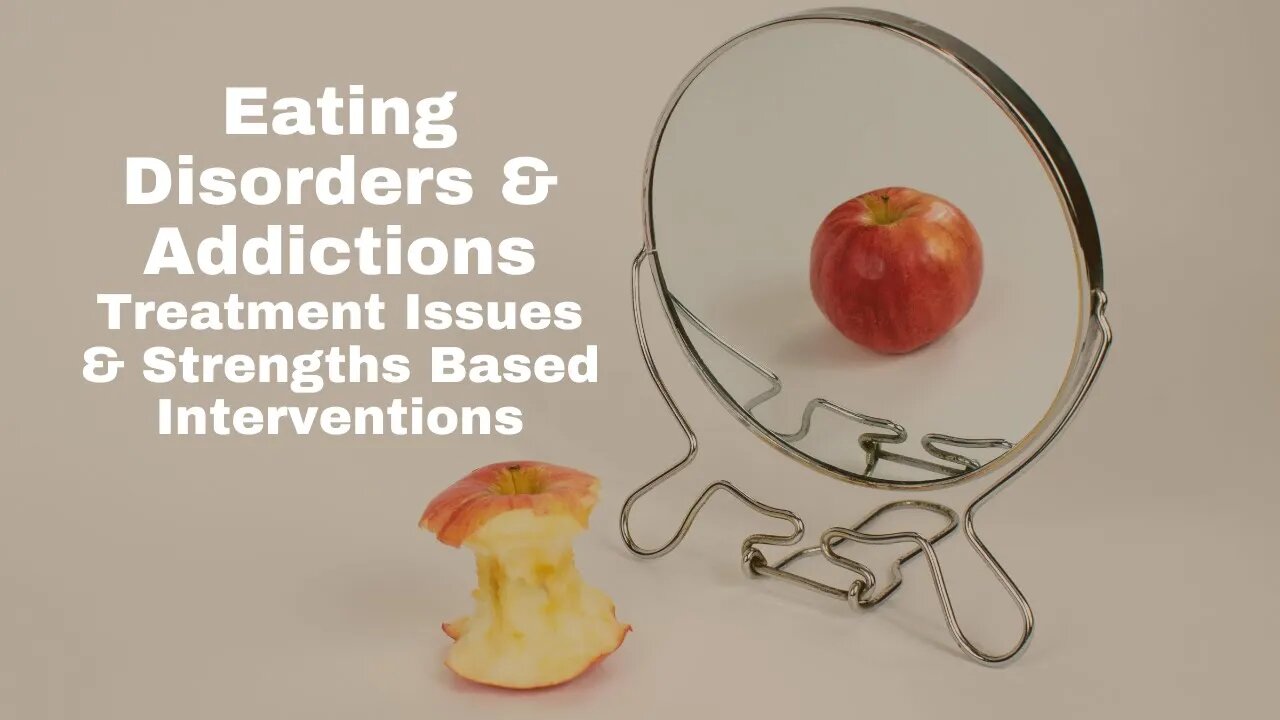Premium Only Content

Eating Disorders and Addictions
Want to chat with me? Join me at https://members.docsnipes.com/ For $10/month you get access to my daily tips for health and wellness and you can text chat with me privately.
CEUs available https://allceus.com/member/cart/index/product/id/56/c/
Video by Dr. Dawn Elise Snipes on integrative behavioral health approaches including counseling techniques and skills for improving mental health and reducing mental illness.
#eatingdisorders #strengthsbased #counselingskills
Eating Disorders and Addictions have significant overlap in risk factors and interventions. Additionally, when one cannot be accessed, people may resort to the other. There is a high rate of co-occurrence of eating disorders in people with addictions.
Please SUBSCRIBE and click the BELL to be notified when we release new videos and when Dr. Dawn Elise Snipes is going live each month.
Cheap CEUs are available at https://www.allceus.com/live-interactive-webinars/
Therapy with Eating Disorders and Addictions
Dr. Dawn-Elise Snipes PhD, LPC, LMHC
Clinical Director, AllCEUs.com
Objectives
Based in Part on Brief Therapy with Eating Disorders by Barbara McFarland, and the Overcoming Disordered Eating Protocol by the Centre for Clinical Intervention
- Shifting paradigms to one of resourcefulness vs. sickness
- Identifying key interviewing questions to develop a strengths-based alliance
Prevalence of Eating Disorders
- 20% of women struggle with disordered eating
- 10-15% of people with eating disorders are male
- 40% of male football players were found to engage in disordered eating
- Muscle dysmorphia and body fat preoccupation is seen in a majority of bodybuilders and wrestlers
- 90% of people with eating disorders become symptomatic between 12 and 25
Risk Factors
- Psychological Risk Factors
- Low self-worth and low-self esteem /Feelings of inadequacy
- Obsessive behaviors regarding food and diets and may often also display obsessive-compulsive personality traits in other parts of their life.
- A strong, even extreme drive for perfectionism.
- They have unrealistic expectations of themselves and others
- In spite of their many achievements, they feel inadequate.
- They see the world dichotomously
- Negative affect: depression, anxiety, anger, stress or loneliness
- A sense of lack of control in life
- Wanting to take control and fix things in an unhappy life, but not really knowing how, and under the influence of a culture that equates success and happiness with thinness, the person tackles her/his body instead of the problem at hand.
Risk Factors
- Interpersonal
- Troubled personal relationships
- Difficulty expressing emotions and feelings (including alexthymia)
- History of being teased or ridiculed based on size or weight (negative inner critic)
- History of physical or sexual abuse.
- Some people with eating disorders use the behaviors to avoid sexuality.
- Others use them to try to take control of themselves and their lives by creating and winning the power struggles inside
Risk Factors
- Interpersonal
- Inside they still they feel weak, powerless, victimized, defeated, and resentful.
- People with eating disorders often lack a sense of identity and try to define themselves by manufacturing an admired exterior.
- Often they desperately want healthy connections to others but fear criticism and rejection
Risk Factors
- Family Risk Factors
- Family history of an eating disorder
- Familial attitudes toward weight, dieting and eating
- Overvaluing appearance
- Making jokes about appearance
- Deficit in emotional support and secure attachment
- Overly enmeshed or detached family dynamics: Smothered in overprotective families, or abandoned, misunderstood, and alone
- These families tend to be overprotective, rigid, and ineffective at resolving conflict.
The Therapeutic Relationship
- Determines clients
- Willingness to openly discuss and explore behavior patterns
- Willingness to consider altering eating behavior
- Willingness to disclose accurate information
Motivation Determinants
- The clients sense of safety/alliance with the therapist
- Sense of self-efficacy and empowerment
- Client and therapist have similar goals for treatment
- The cost/benefit of the current behaviors
- Fear of fat vs. desire to be healthy
- Social pressures vs. desire to change
Motivation Dimensions
- Physical
- Affective
- Cognitive
- Environmental
- Relational
AllCEUs provides multimedia counselor education and CEUs for LPCs, LMHCs, LMFTs and LCSWs as well as addiction counselor precertification training and continuing education.
Live, Interactive Webinars ($5)
Unlimited Counseling CEs for $59
Specialty Certificates starting at $89 including Addiction Counselor, RecoveryCoach, Pee rSupport Specialist, Trauma Informed Care, BHT, Etherapy
-
 2:40
2:40
DocSnipes
1 year agoWhy SMART Goal Setting Doesn't Work
195 -
 54:26
54:26
ZeeeMedia
12 hours agoWhy America Needs Radical Change & The New Governor of NY? ft. Larry Sharpe | Daily Pulse Ep 143
14.1K4 -
 16:17
16:17
stateofdaniel
1 day agoDems Caught EDITING Epstein Emails to FRAME Trump
13.9K24 -
 13:52
13:52
Comedy Dynamics
1 day agoSam Tallent Roasting the Audience
44.5K3 -
 16:28
16:28
Nikko Ortiz
17 hours agoPainful Fails That HURT To Watch...
38.7K9 -
 9:40
9:40
MattMorseTV
16 hours ago $19.38 earnedAbsolutely NO ONE saw this coming…
21.8K77 -
 2:04:53
2:04:53
Side Scrollers Podcast
20 hours agoHasan Piker Goes FULL Propaganda + Kirsche & Craig Make “The List” + More | Side Scrollers
51.8K8 -
 17:59
17:59
GritsGG
16 hours ago15 Win Streak on Warzone! Journey to 4000 Wins!
13.9K -
 7:40
7:40
Blabbering Collector
2 days agoLEAKED: Draco Malfoy, Hooch, Neville Longbottom! | Harry Potter HBO Show Update, Wizarding News
48.7K5 -
 LIVE
LIVE
Lofi Girl
3 years agolofi hip hop radio 📚 - beats to relax/study to
318 watching